企业财务绩效评价体系研究
- 格式:doc
- 大小:81.00 KB
- 文档页数:23
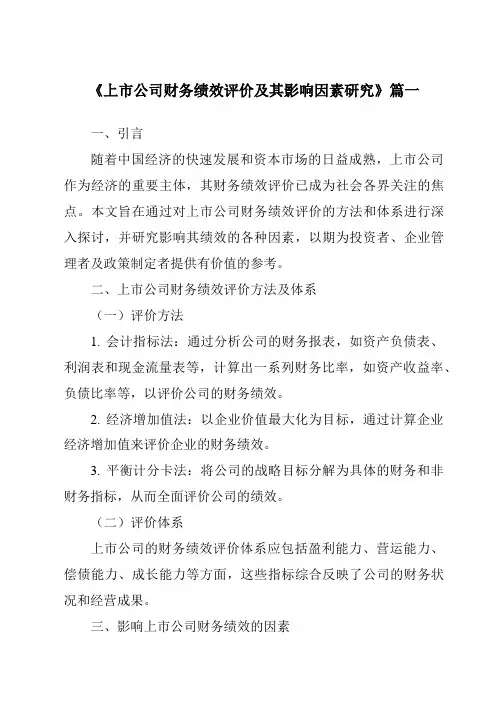
《上市公司财务绩效评价及其影响因素研究》篇一一、引言随着中国经济的快速发展和资本市场的日益成熟,上市公司作为经济的重要主体,其财务绩效评价已成为社会各界关注的焦点。
本文旨在通过对上市公司财务绩效评价的方法和体系进行深入探讨,并研究影响其绩效的各种因素,以期为投资者、企业管理者及政策制定者提供有价值的参考。
二、上市公司财务绩效评价方法及体系(一)评价方法1. 会计指标法:通过分析公司的财务报表,如资产负债表、利润表和现金流量表等,计算出一系列财务比率,如资产收益率、负债比率等,以评价公司的财务绩效。
2. 经济增加值法:以企业价值最大化为目标,通过计算企业经济增加值来评价企业的财务绩效。
3. 平衡计分卡法:将公司的战略目标分解为具体的财务和非财务指标,从而全面评价公司的绩效。
(二)评价体系上市公司的财务绩效评价体系应包括盈利能力、营运能力、偿债能力、成长能力等方面,这些指标综合反映了公司的财务状况和经营成果。
三、影响上市公司财务绩效的因素(一)内部因素1. 公司治理结构:合理的公司治理结构能够提高公司的运营效率和管理水平,从而提升财务绩效。
2. 企业管理水平:企业管理者的素质、能力和经验对公司的战略规划、市场拓展、产品研发等方面具有重要影响,进而影响公司的财务绩效。
3. 公司创新能力:创新能力是公司持续发展的关键,通过技术创新、管理创新等手段提高公司的核心竞争力。
(二)外部因素1. 宏观经济环境:包括经济增长、政策环境、市场需求等因素,对上市公司的财务绩效产生重要影响。
2. 行业竞争状况:行业内的竞争程度、市场占有率等都会影响公司的财务绩效。
3. 法律法规和监管政策:法律法规和监管政策的变动可能对公司的运营产生重大影响,从而影响其财务绩效。
四、研究结论与建议(一)研究结论通过对上市公司财务绩效评价方法及体系的研究,我们发现:不同的评价方法和体系各有优缺点,应结合公司的实际情况选择合适的评价方法;影响上市公司财务绩效的因素众多,包括内部因素和外部因素,这些因素相互交织、共同作用。
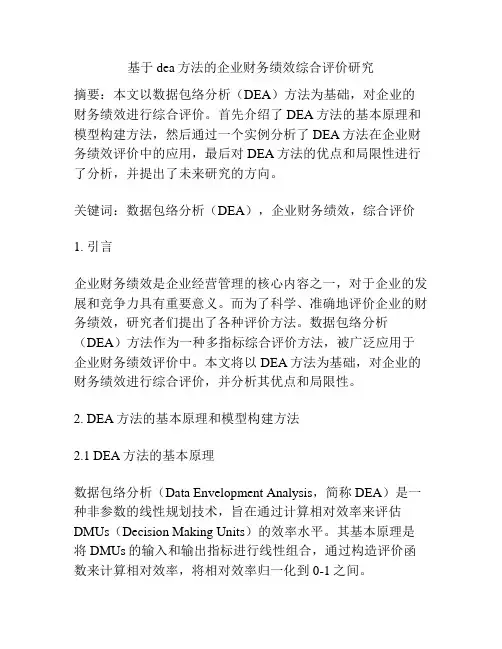
基于dea方法的企业财务绩效综合评价研究摘要:本文以数据包络分析(DEA)方法为基础,对企业的财务绩效进行综合评价。
首先介绍了DEA方法的基本原理和模型构建方法,然后通过一个实例分析了DEA方法在企业财务绩效评价中的应用,最后对DEA方法的优点和局限性进行了分析,并提出了未来研究的方向。
关键词:数据包络分析(DEA),企业财务绩效,综合评价1. 引言企业财务绩效是企业经营管理的核心内容之一,对于企业的发展和竞争力具有重要意义。
而为了科学、准确地评价企业的财务绩效,研究者们提出了各种评价方法。
数据包络分析(DEA)方法作为一种多指标综合评价方法,被广泛应用于企业财务绩效评价中。
本文将以DEA方法为基础,对企业的财务绩效进行综合评价,并分析其优点和局限性。
2. DEA方法的基本原理和模型构建方法2.1 DEA方法的基本原理数据包络分析(Data Envelopment Analysis,简称DEA)是一种非参数的线性规划技术,旨在通过计算相对效率来评估DMUs(Decision Making Units)的效率水平。
其基本原理是将DMUs的输入和输出指标进行线性组合,通过构造评价函数来计算相对效率,将相对效率归一化到0-1之间。
2.2 DEA方法的模型构建方法DEA方法的模型构建方法可以分为效率评价模型和效率前沿模型两种。
效率评价模型主要用于计算各个DMU的相对效率,而效率前沿模型则用于找出最优的DMU,并计算其相对效率。
其中,常用的效率评价模型有CCR模型和BCC模型,效率前沿模型有CCR和Additive模型、BCC和Additive模型等。
3. DEA方法在企业财务绩效评价中的应用DEA方法在企业财务绩效评价中具有广泛的应用价值。
通过构建合理的输入和输出指标体系,可以综合评价企业的财务绩效,并对不同的DMUs进行排序和比较。
同时,DEA方法还可以通过计算相对效率,找出财务绩效较优的企业,为其他企业提供参考和改进方向。
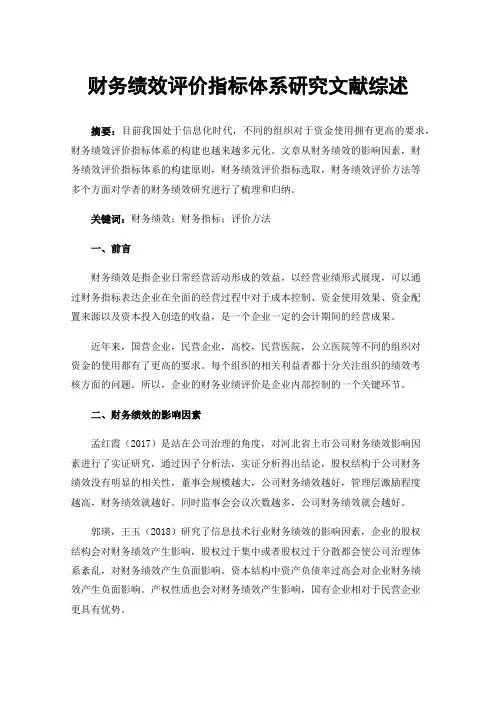
财务绩效评价指标体系研究文献综述摘要:目前我国处于信息化时代,不同的组织对于资金使用拥有更高的要求,财务绩效评价指标体系的构建也越来越多元化。
文章从财务绩效的影响因素,财务绩效评价指标体系的构建原则,财务绩效评价指标选取,财务绩效评价方法等多个方面对学者的财务绩效研究进行了梳理和归纳。
关键词:财务绩效;财务指标;评价方法一、前言财务绩效是指企业日常经营活动形成的效益,以经营业绩形式展现,可以通过财务指标表达企业在全面的经营过程中对于成本控制、资金使用效果、资金配置来源以及资本投入创造的收益,是一个企业一定的会计期间的经营成果。
近年来,国营企业,民营企业,高校,民营医院,公立医院等不同的组织对资金的使用都有了更高的要求。
每个组织的相关利益者都十分关注组织的绩效考核方面的问题。
所以,企业的财务业绩评价是企业内部控制的一个关键环节。
二、财务绩效的影响因素孟红霞(2017)是站在公司治理的角度,对河北省上市公司财务绩效影响因素进行了实证研究,通过因子分析法,实证分析得出结论,股权结构于公司财务绩效没有明显的相关性,董事会规模越大,公司财务绩效越好,管理层激励程度越高,财务绩效就越好。
同时监事会会议次数越多,公司财务绩效就会越好。
郭瑛,王玉(2018)研究了信息技术行业财务绩效的影响因素,企业的股权结构会对财务绩效产生影响,股权过于集中或者股权过于分散都会使公司治理体系紊乱,对财务绩效产生负面影响。
资本结构中资产负债率过高会对企业财务绩效产生负面影响。
产权性质也会对财务绩效产生影响,国有企业相对于民营企业更具有优势。
李霞,谢晓霞(2019)对非营利组织的财务绩效进行了研究,作者阅读了大量文献,认为影响非盈利组织财务绩效因素很多,非盈利组织的理事会特征,创新创业,财务相关因素,治理特征等都会对非盈利组织的财务绩效产生影响,理事会理事规模,职业背景多样化,政治关联,女性比率会对财务绩效产生积极影响。
在财务相关因素方面,筹资能力对财务绩效产生的积极性更强。
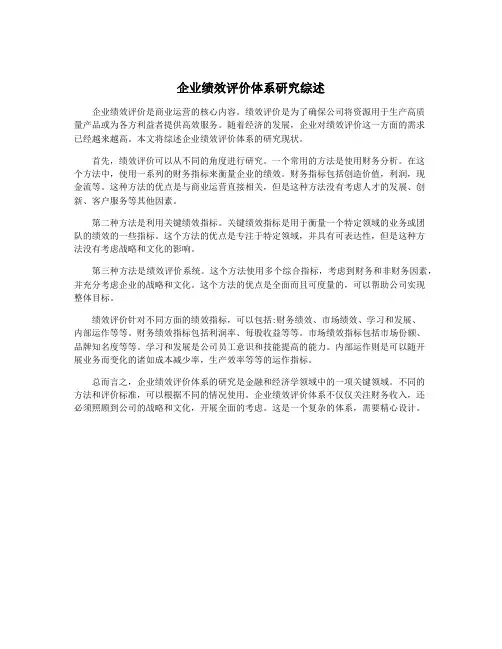
企业绩效评价体系研究综述企业绩效评价是商业运营的核心内容。
绩效评价是为了确保公司将资源用于生产高质量产品或为各方利益者提供高效服务。
随着经济的发展,企业对绩效评价这一方面的需求已经越来越高。
本文将综述企业绩效评价体系的研究现状。
首先,绩效评价可以从不同的角度进行研究。
一个常用的方法是使用财务分析。
在这个方法中,使用一系列的财务指标来衡量企业的绩效。
财务指标包括创造价值,利润,现金流等。
这种方法的优点是与商业运营直接相关,但是这种方法没有考虑人才的发展、创新、客户服务等其他因素。
第二种方法是利用关键绩效指标。
关键绩效指标是用于衡量一个特定领域的业务或团队的绩效的一些指标。
这个方法的优点是专注于特定领域,并具有可表达性,但是这种方法没有考虑战略和文化的影响。
第三种方法是绩效评价系统。
这个方法使用多个综合指标,考虑到财务和非财务因素,并充分考虑企业的战略和文化。
这个方法的优点是全面而且可度量的,可以帮助公司实现整体目标。
绩效评价针对不同方面的绩效指标,可以包括:财务绩效、市场绩效、学习和发展、内部运作等等。
财务绩效指标包括利润率、每股收益等等。
市场绩效指标包括市场份额、品牌知名度等等。
学习和发展是公司员工意识和技能提高的能力。
内部运作则是可以随开展业务而变化的诸如成本减少率,生产效率等等的运作指标。
总而言之,企业绩效评价体系的研究是金融和经济学领域中的一项关键领域。
不同的方法和评价标准,可以根据不同的情况使用。
企业绩效评价体系不仅仅关注财务收入,还必须照顾到公司的战略和文化,开展全面的考虑。
这是一个复杂的体系,需要精心设计。
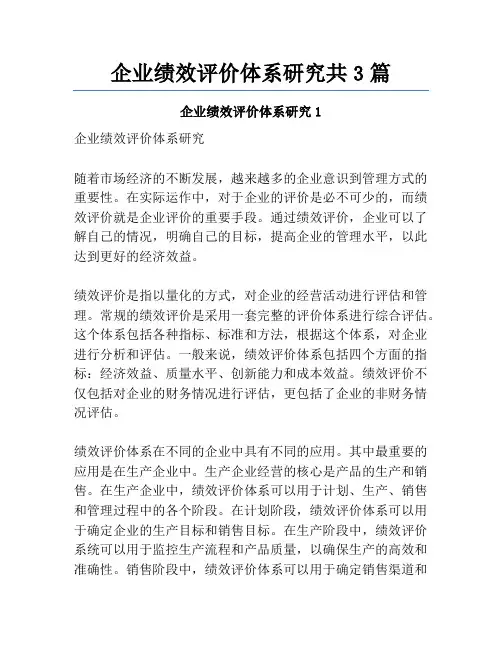
企业绩效评价体系研究共3篇企业绩效评价体系研究1企业绩效评价体系研究随着市场经济的不断发展,越来越多的企业意识到管理方式的重要性。
在实际运作中,对于企业的评价是必不可少的,而绩效评价就是企业评价的重要手段。
通过绩效评价,企业可以了解自己的情况,明确自己的目标,提高企业的管理水平,以此达到更好的经济效益。
绩效评价是指以量化的方式,对企业的经营活动进行评估和管理。
常规的绩效评价是采用一套完整的评价体系进行综合评估。
这个体系包括各种指标、标准和方法,根据这个体系,对企业进行分析和评估。
一般来说,绩效评价体系包括四个方面的指标:经济效益、质量水平、创新能力和成本效益。
绩效评价不仅包括对企业的财务情况进行评估,更包括了企业的非财务情况评估。
绩效评价体系在不同的企业中具有不同的应用。
其中最重要的应用是在生产企业中。
生产企业经营的核心是产品的生产和销售。
在生产企业中,绩效评价体系可以用于计划、生产、销售和管理过程中的各个阶段。
在计划阶段,绩效评价体系可以用于确定企业的生产目标和销售目标。
在生产阶段中,绩效评价系统可以用于监控生产流程和产品质量,以确保生产的高效和准确性。
销售阶段中,绩效评价体系可以用于确定销售渠道和销售数据。
在管理阶段,绩效评价体系可以用于提高企业管理水平,减少资源浪费等。
除了生产企业,绩效评价体系还广泛应用于服务企业。
服务企业的核心是提供服务,并以此获得经济效益。
在服务企业中,绩效评价体系可以用于服务质量的管理、提升员工的士气和绩效管理等。
具体而言,可以通过客户投诉率、客户满意度等指标来评估服务质量;通过员工的人员流失率、薪酬水平等指标来评估员工绩效;通过客户投资收益率、资产负债比例等指标来评估企业的管理效果。
绩效评价体系对于企业的管理非常有益。
首先,评价体系可以用于激励和激励员工,使他们更加积极地为企业工作。
其次,评价体系可以用于鼓励创新,提高企业的创新水平。
最后,评价体系可以用于提高企业管理水平,减少浪费和成本。
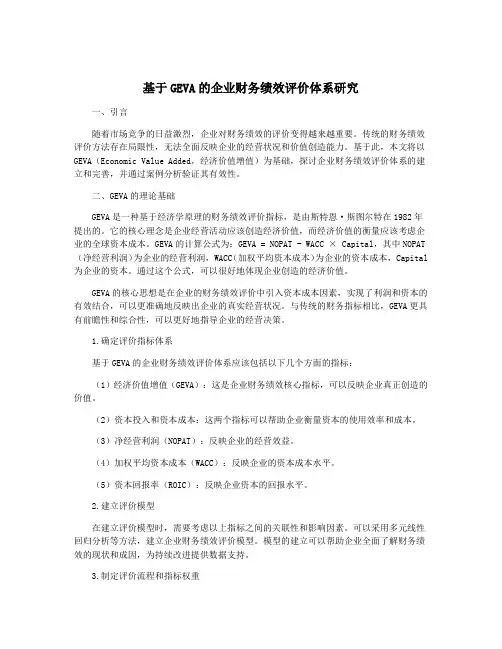
基于GEVA的企业财务绩效评价体系研究一、引言随着市场竞争的日益激烈,企业对财务绩效的评价变得越来越重要。
传统的财务绩效评价方法存在局限性,无法全面反映企业的经营状况和价值创造能力。
基于此,本文将以GEVA(Economic Value Added,经济价值增值)为基础,探讨企业财务绩效评价体系的建立和完善,并通过案例分析验证其有效性。
二、GEVA的理论基础GEVA是一种基于经济学原理的财务绩效评价指标,是由斯特恩·斯图尔特在1982年提出的。
它的核心理念是企业经营活动应该创造经济价值,而经济价值的衡量应该考虑企业的全球资本成本。
GEVA的计算公式为:GEVA = NOPAT - WACC × Capital,其中NOPAT (净经营利润)为企业的经营利润,WACC(加权平均资本成本)为企业的资本成本,Capital 为企业的资本。
通过这个公式,可以很好地体现企业创造的经济价值。
GEVA的核心思想是在企业的财务绩效评价中引入资本成本因素,实现了利润和资本的有效结合,可以更准确地反映出企业的真实经营状况。
与传统的财务指标相比,GEVA更具有前瞻性和综合性,可以更好地指导企业的经营决策。
1.确定评价指标体系基于GEVA的企业财务绩效评价体系应该包括以下几个方面的指标:(1)经济价值增值(GEVA):这是企业财务绩效核心指标,可以反映企业真正创造的价值。
(2)资本投入和资本成本:这两个指标可以帮助企业衡量资本的使用效率和成本。
(3)净经营利润(NOPAT):反映企业的经营效益。
(4)加权平均资本成本(WACC):反映企业的资本成本水平。
(5)资本回报率(ROIC):反映企业资本的回报水平。
2.建立评价模型在建立评价模型时,需要考虑以上指标之间的关联性和影响因素。
可以采用多元线性回归分析等方法,建立企业财务绩效评价模型。
模型的建立可以帮助企业全面了解财务绩效的现状和成因,为持续改进提供数据支持。
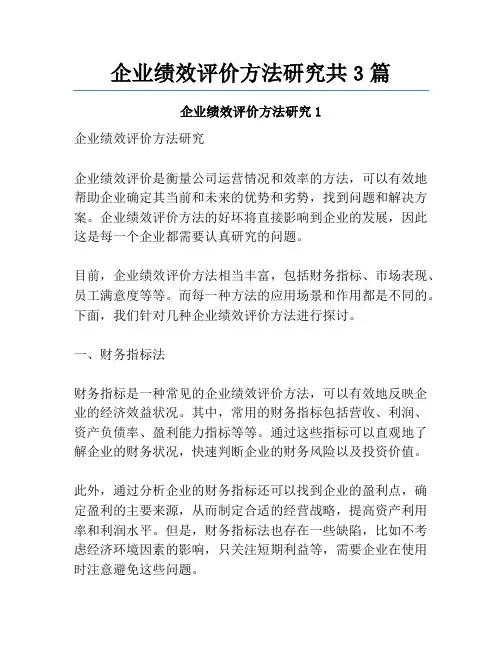
企业绩效评价方法研究共3篇企业绩效评价方法研究1企业绩效评价方法研究企业绩效评价是衡量公司运营情况和效率的方法,可以有效地帮助企业确定其当前和未来的优势和劣势,找到问题和解决方案。
企业绩效评价方法的好坏将直接影响到企业的发展,因此这是每一个企业都需要认真研究的问题。
目前,企业绩效评价方法相当丰富,包括财务指标、市场表现、员工满意度等等。
而每一种方法的应用场景和作用都是不同的。
下面,我们针对几种企业绩效评价方法进行探讨。
一、财务指标法财务指标是一种常见的企业绩效评价方法,可以有效地反映企业的经济效益状况。
其中,常用的财务指标包括营收、利润、资产负债率、盈利能力指标等等。
通过这些指标可以直观地了解企业的财务状况,快速判断企业的财务风险以及投资价值。
此外,通过分析企业的财务指标还可以找到企业的盈利点,确定盈利的主要来源,从而制定合适的经营战略,提高资产利用率和利润水平。
但是,财务指标法也存在一些缺陷,比如不考虑经济环境因素的影响,只关注短期利益等,需要企业在使用时注意避免这些问题。
二、市场表现法市场表现是企业绩效评价的另一个方面,它主要关注企业在市场中的表现和影响力。
通常,企业的市场表现是通过市场份额、品牌知名度、市场反馈等多个维度来衡量的。
通过这种方法可以了解企业在市场中的地位,及时发现和解决市场问题,帮助企业提高市场占有率和品牌价值。
比如,在电商领域,通过网站访问量、购买率、客户留存等多个维度来衡量企业的市场表现,从而调整销售策略,提高销售业绩。
不过,市场表现法也存在一些局限,比如无法评估产品或服务的质量、不能正确衡量竞争对手的实力等问题。
三、绩效评估法企业的绩效评估是绩效评价的最终结果,可以根据企业的目标和业务计划来评估企业的绩效。
这种方法不仅考虑了企业的财务情况和市场表现,还综合考虑了企业的员工、客户和社会的需求和期望,可以更全面地衡量企业的绩效。
比如,一些企业采用360度绩效评估来评估员工的表现,从而找到员工的优点和改进的方面,帮助员工更好地完成工作,提升企业的工作效率。
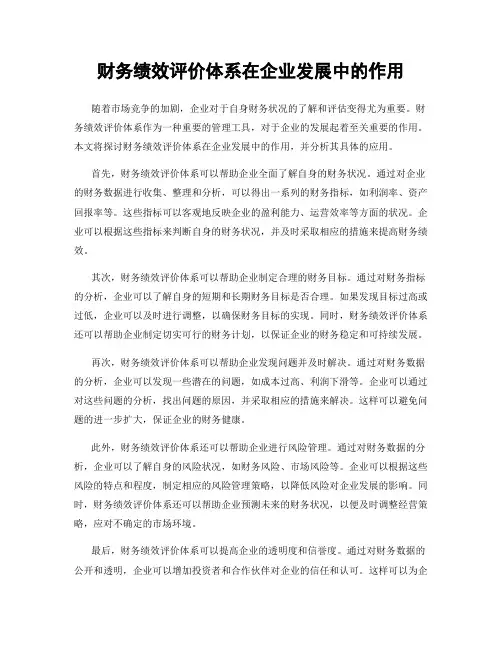
财务绩效评价体系在企业发展中的作用随着市场竞争的加剧,企业对于自身财务状况的了解和评估变得尤为重要。
财务绩效评价体系作为一种重要的管理工具,对于企业的发展起着至关重要的作用。
本文将探讨财务绩效评价体系在企业发展中的作用,并分析其具体的应用。
首先,财务绩效评价体系可以帮助企业全面了解自身的财务状况。
通过对企业的财务数据进行收集、整理和分析,可以得出一系列的财务指标,如利润率、资产回报率等。
这些指标可以客观地反映企业的盈利能力、运营效率等方面的状况。
企业可以根据这些指标来判断自身的财务状况,并及时采取相应的措施来提高财务绩效。
其次,财务绩效评价体系可以帮助企业制定合理的财务目标。
通过对财务指标的分析,企业可以了解自身的短期和长期财务目标是否合理。
如果发现目标过高或过低,企业可以及时进行调整,以确保财务目标的实现。
同时,财务绩效评价体系还可以帮助企业制定切实可行的财务计划,以保证企业的财务稳定和可持续发展。
再次,财务绩效评价体系可以帮助企业发现问题并及时解决。
通过对财务数据的分析,企业可以发现一些潜在的问题,如成本过高、利润下滑等。
企业可以通过对这些问题的分析,找出问题的原因,并采取相应的措施来解决。
这样可以避免问题的进一步扩大,保证企业的财务健康。
此外,财务绩效评价体系还可以帮助企业进行风险管理。
通过对财务数据的分析,企业可以了解自身的风险状况,如财务风险、市场风险等。
企业可以根据这些风险的特点和程度,制定相应的风险管理策略,以降低风险对企业发展的影响。
同时,财务绩效评价体系还可以帮助企业预测未来的财务状况,以便及时调整经营策略,应对不确定的市场环境。
最后,财务绩效评价体系可以提高企业的透明度和信誉度。
通过对财务数据的公开和透明,企业可以增加投资者和合作伙伴对企业的信任和认可。
这样可以为企业吸引更多的投资和资源,促进企业的发展。
同时,财务绩效评价体系还可以提高企业的内部管理水平,增强企业的竞争力和可持续发展能力。
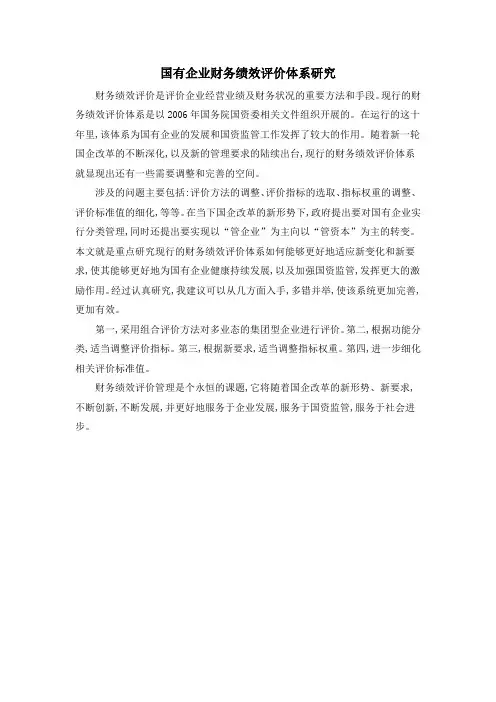
国有企业财务绩效评价体系研究
财务绩效评价是评价企业经营业绩及财务状况的重要方法和手段。
现行的财务绩效评价体系是以2006年国务院国资委相关文件组织开展的。
在运行的这十年里,该体系为国有企业的发展和国资监管工作发挥了较大的作用。
随着新一轮国企改革的不断深化,以及新的管理要求的陆续出台,现行的财务绩效评价体系就显现出还有一些需要调整和完善的空间。
涉及的问题主要包括:评价方法的调整、评价指标的选取、指标权重的调整、评价标准值的细化,等等。
在当下国企改革的新形势下,政府提出要对国有企业实行分类管理,同时还提出要实现以“管企业”为主向以“管资本”为主的转变。
本文就是重点研究现行的财务绩效评价体系如何能够更好地适应新变化和新要求,使其能够更好地为国有企业健康持续发展,以及加强国资监管,发挥更大的激励作用。
经过认真研究,我建议可以从几方面入手,多错并举,使该系统更加完善,更加有效。
第一,采用组合评价方法对多业态的集团型企业进行评价。
第二,根据功能分类,适当调整评价指标。
第三,根据新要求,适当调整指标权重。
第四,进一步细化相关评价标准值。
财务绩效评价管理是个永恒的课题,它将随着国企改革的新形势、新要求,不断创新,不断发展,并更好地服务于企业发展,服务于国资监管,服务于社会进步。
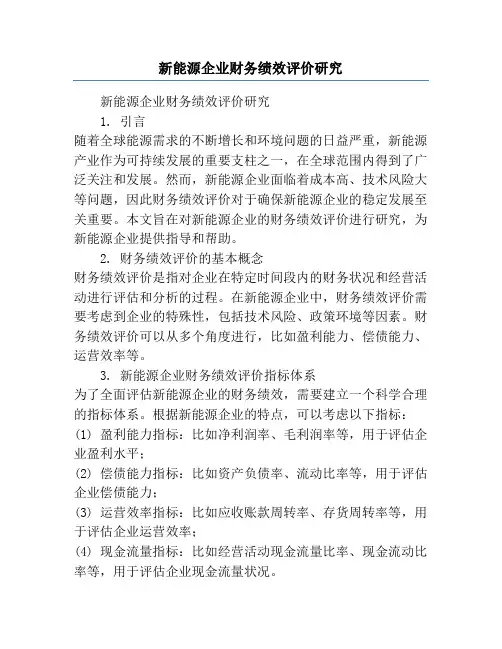
新能源企业财务绩效评价研究新能源企业财务绩效评价研究1. 引言随着全球能源需求的不断增长和环境问题的日益严重,新能源产业作为可持续发展的重要支柱之一,在全球范围内得到了广泛关注和发展。
然而,新能源企业面临着成本高、技术风险大等问题,因此财务绩效评价对于确保新能源企业的稳定发展至关重要。
本文旨在对新能源企业的财务绩效评价进行研究,为新能源企业提供指导和帮助。
2. 财务绩效评价的基本概念财务绩效评价是指对企业在特定时间段内的财务状况和经营活动进行评估和分析的过程。
在新能源企业中,财务绩效评价需要考虑到企业的特殊性,包括技术风险、政策环境等因素。
财务绩效评价可以从多个角度进行,比如盈利能力、偿债能力、运营效率等。
3. 新能源企业财务绩效评价指标体系为了全面评估新能源企业的财务绩效,需要建立一个科学合理的指标体系。
根据新能源企业的特点,可以考虑以下指标:(1) 盈利能力指标:比如净利润率、毛利润率等,用于评估企业盈利水平;(2) 偿债能力指标:比如资产负债率、流动比率等,用于评估企业偿债能力;(3) 运营效率指标:比如应收账款周转率、存货周转率等,用于评估企业运营效率;(4) 现金流量指标:比如经营活动现金流量比率、现金流动比率等,用于评估企业现金流量状况。
4. 财务绩效评价方法在对新能源企业进行财务绩效评价时,可以采用多种方法,如:(1) 比较分析法:通过比较企业与同行业企业的财务指标,评估企业在行业中的地位和竞争力;(2) 趋势分析法:通过分析企业在不同时间段内的财务数据,评估企业的发展趋势和变化情况;(3) 相关性分析法:通过分析各项指标之间的关系,找出对企业财务绩效影响最大的因素;(4) 综合评价法:将各项评价指标进行加权综合,得出综合评价结果。
5. 财务绩效评价中的问题与挑战在新能源企业的财务绩效评价过程中,也存在一些问题和挑战。
例如,新能源企业的特殊性使得传统的财务指标无法全面评价企业的财务绩效;新能源企业的业务模式和盈利模式独特,需要针对性的评价方法;新能源企业技术更新换代快,导致财务数据的时效性有限等。

企业绩效评价体系构建与应用研究在当今竞争激烈的市场环境中,企业要想实现可持续发展,就必须建立一套科学、合理、有效的绩效评价体系。
绩效评价不仅能够帮助企业了解自身的经营状况和发展趋势,还能为企业的决策提供重要依据,激发员工的工作积极性和创造力,从而提升企业的整体竞争力。
本文将对企业绩效评价体系的构建与应用进行深入研究。
一、企业绩效评价体系的重要性1、为决策提供依据企业的管理者在制定战略、规划资源分配、调整业务结构等重大决策时,需要有准确、全面的信息作为支撑。
绩效评价体系通过对企业各项经营活动的量化评估,能够为管理者提供关于企业运营状况的清晰画像,帮助他们发现问题、把握机遇,从而做出更加明智的决策。
2、激励员工一个公正、透明的绩效评价体系能够让员工清楚地了解自己的工作表现与企业目标之间的关系,以及自己的工作成果对企业的贡献。
当员工的努力得到认可和奖励时,他们会更有动力去提高工作效率和质量,为企业创造更多价值。
3、促进企业改进通过绩效评价,企业可以发现自身在运营过程中存在的不足之处,例如流程不合理、资源浪费、市场反应迟缓等。
这些问题的暴露为企业提供了改进的方向和重点,促使企业不断优化管理流程、提升运营效率,实现持续发展。
二、企业绩效评价体系的构建原则1、战略导向原则绩效评价体系应与企业的战略目标紧密结合,确保各项评价指标能够反映企业战略的实现程度。
只有这样,绩效评价才能为企业的战略落地提供有力支持。
2、全面性原则评价体系应涵盖企业经营的各个方面,包括财务、客户、内部流程、学习与成长等。
不能仅仅关注财务指标,而忽视了非财务指标对企业长期发展的重要性。
3、可衡量性原则评价指标应具有明确的定义和计算方法,能够进行客观、准确的衡量。
模糊不清或难以量化的指标会导致评价结果的主观性和不确定性,影响绩效评价的公正性和有效性。
4、动态性原则企业面临的内外部环境是不断变化的,因此绩效评价体系也应随之调整和优化。
要定期对评价指标进行审查和更新,确保其能够适应企业发展的新要求。
企业财务管理中的财务指标体系与绩效评价在企业财务管理中,财务指标体系扮演着至关重要的角色,它是评估企业财务状况和经营绩效的关键工具。
通过合理运用财务指标体系来指导经营决策和形成合理的绩效评价机制,企业能够更好地实现经营目标,提升经营效益。
一、财务指标体系的构建企业财务指标体系应该根据企业的经营特点和目标需求来构建,以反映企业整体财务状况和经营绩效。
常见的财务指标包括财务结构指标、财务活动指标和盈利能力指标等。
1. 财务结构指标财务结构指标主要衡量企业的资产、负债和所有者权益之间的比例关系,反映企业的财务风险和偿债能力。
常见的财务结构指标包括资产负债率、权益比率和流动比率等。
2. 财务活动指标财务活动指标主要反映企业的经营活动水平和资产利用效率。
常见的财务活动指标包括存货周转率、应收账款周转率和固定资产周转率等。
3. 盈利能力指标盈利能力指标是衡量企业盈利状况和盈利能力的关键指标。
常见的盈利能力指标包括毛利率、净利率和总资产收益率等。
二、财务指标体系的运用企业在实际运营中,应根据财务指标体系来指导经营决策和评价绩效。
具体而言,可以从以下几个方面进行运用。
1. 经营决策支持财务指标体系可以为企业的经营决策提供重要支持和参考依据。
通过对财务指标的分析与比较,企业管理层可以了解企业的财务状况,判断经营方向,并制定相应的经营策略。
2. 绩效评价体系财务指标体系也是企业绩效评价的重要内容之一。
通过对财务指标的监测和比较,企业可以及时了解绩效状况,发现问题和优势,从而采取相应的措施进行调整和优化。
3. 外部融资和投资者关系管理财务指标体系也是外部融资和投资者关系管理的重要依据。
投资者、金融机构等外部利益相关方通常会关注企业的财务状况和经营绩效,通过对财务指标的披露和解读,可以增强对外部利益相关方的信任和合作。
三、财务指标体系与绩效评价的关联财务指标体系与绩效评价密切相关,二者相互作用,互为支撑。
1. 财务指标体系对绩效评价的影响财务指标体系为绩效评价提供了可量化的指标和标准,通过对财务指标的分析和评估,可以客观地衡量企业的经营成果和绩效水平。
《上市公司财务绩效评价及其影响因素研究》篇一一、引言随着经济全球化的深入发展,上市公司作为市场经济的重要组成部分,其财务绩效评价成为了投资者、债权人、政府监管部门及社会公众关注的焦点。
本文旨在探讨上市公司财务绩效评价的体系、方法及其影响因素,以期为投资者及决策者提供有益的参考。
二、上市公司财务绩效评价体系1. 评价指标上市公司的财务绩效评价主要依据一系列的财务指标,包括盈利能力、营运能力、偿债能力及增长能力等方面。
其中,盈利能力指标如净利润率、总资产收益率等;营运能力指标如存货周转率、应收账款周转率等;偿债能力指标如流动比率、速动比率等;增长能力指标如营业收入增长率、净利润增长率等。
2. 评价方法评价上市公司财务绩效的方法主要包括综合指数法、数据包络分析(DEA)法、因子分析法等。
其中,综合指数法通过赋予各项指标不同的权重,综合反映公司的整体财务状况;DEA法侧重于评价公司的相对效率;因子分析法则通过提取公因子,揭示公司财务状况的内在规律。
三、财务绩效影响因素分析1. 宏观经济环境宏观经济环境对上市公司财务绩效具有重要影响。
例如,经济增长率、通货膨胀率、利率、汇率等因素的变化,都会对公司的销售收入、成本、资金运作等方面产生影响,从而影响公司的财务绩效。
2. 行业特点不同行业的上市公司,其财务绩效受行业特点的影响较大。
行业竞争程度、行业生命周期、行业政策等都会对公司的市场地位、产品定价、成本控制等方面产生影响,进而影响公司的财务绩效。
3. 公司内部因素公司内部因素也是影响财务绩效的重要因素。
包括公司治理结构、管理团队的素质、技术创新、产品研发、市场营销等方面的能力,都会直接影响公司的财务绩效。
此外,公司的成本控制、资金运作、风险管理等方面的能力,也是影响公司财务绩效的关键因素。
四、研究结论与建议1. 研究结论通过对上市公司财务绩效评价体系及影响因素的分析,我们可以得出以下结论:首先,科学合理的财务绩效评价体系对于全面反映公司财务状况、评估公司价值具有重要意义;其次,宏观经济环境、行业特点及公司内部因素都会对上市公司财务绩效产生影响;最后,提高公司治理水平、加强技术创新和产品研发、优化市场营销策略等,是提高上市公司财务绩效的有效途径。
企业绩效评价的研究进展及发展趋势共3篇企业绩效评价的研究进展及发展趋势1企业绩效评价的研究进展及发展趋势企业绩效评价一直是企业管理的重要工作之一。
通过对企业的各项关键业绩进行分析、衡量和比较,可以帮助企业发现问题,掌握优势和劣势,优化管理,提高效益。
本文将介绍企业绩效评价的研究进展及发展趋势。
一、企业绩效评价的研究进展(一)传统方法传统的企业绩效评价主要采用财务指标,如收入、利润、资产收益率等。
这种评价方法简单、直接,容易衡量和比较。
然而,它忽视了许多非财务因素,如员工福利、市场占有率、企业形象等,不能全面反映企业的绩效状况。
此外,财务指标常常被企业财务人员和管理者作弊和调整,失去了真实性和可靠性。
(二)绩效管理方法随着企业管理的发展,绩效管理方法应运而生。
这种方法把绩效评价融入到企业的日常管理中,通过设定目标、制定方案、培训教育、激励考核等手段,来促进员工绩效的提高。
这种方法的优点在于综合了各种因素,可以促进企业管理的全面升级。
缺点在于,实施难度较大,需要全员参与和长期管理,成本高。
(三)综合评价方法综合评价方法是近年来兴起的一种评价模式。
它综合了传统方法和绩效管理方法的优点,以多元化的维度对企业的绩效进行评估。
一般包括财务、客户、内部业务流程、学习与成长等方面。
这种方法考虑了贵重客户和亏损客户、企业制度和流程的协调配合、员工能力和职业发展等多个方面的绩效贡献。
它可以真实反映企业的经营状况,优点在于评价维度更全面,缺点在于评估方法不够标准化和可比较,需要不断改进。
二、企业绩效评价的发展趋势(一)智能化随着科技的发展,企业绩效评价也开始向智能化发展。
智能化的绩效评价方法通过等技术对绩效数据进行归类、汇总和分析,可以大大减轻人工工作量,提高评价的准确性和速度,有利于管理决策和优化。
(二)环境化企业绩效评价不再只是关注企业内部的绩效表现,还关注企业的环境表现。
企业要逐渐实现经济发展与环境保护、社会责任的协调发展。
企业财务绩效评价
体系研究
企业财务绩效评价体系研究
摘要:企业是一个以盈利为目的团体,它的绩效考核是股东、债权人、管理者、员工、顾客和供应商、政府等多个利益相关者所关注的焦点。
因此相关者非常关注企业的绩效考核体系。
由于现在企业中经营权和所有权的分离,使得企业内部的信息不对称,在企业的绩效评价体系中财务绩效考核显得无比的重要。
由于财务绩效考核具有数据以收集和综合性的特点,而且财务效益是一个企业生存的基础和发展的动力,因此财务绩效考核是企业绩效考核体系重要的组成部分。
关键词:企业;财务绩效;体系
Abstract:As a profit-making organization, its operating performance is the focus of the shareholders, creditors, managers, employees, customers and suppliers, government and other stakeholders. Therefore, the performance evaluation system should reflect the company's major stakeholders concerns. Due to the asymmetry and separation of enterprise information management and ownership in the modern enterprise, financial evaluation index has a large proportion in the enterprise performance evaluation system. It is comprehensive and easy to collect data and other features, will inevitably become an important component of performance evaluation index system. Also, the financial benefit is the basis for enterprise survival and development, also is the basic motive of
enterprise development. Therefore, should be based on the analysis of financial benefit as the main content of enterprise performance evaluation system.
Keywords: Enterprise;Financial performance;System
目录
一、绪论 0
(一)研究背景 0
(二)研究意义 (1)
(三)研究内容 (1)
二、相关理论综述 (2)
(一)财务绩效评价的概念 (2)
(二)财务绩效评价系统的基本构成要素 (3)
1.评价主体 (3)
2.评价客体 (3)
3.评价指标 (3)
4.评价标准 (4)
(三)财务绩效评价的理论依据 (4)
1.委托代理理论 (5)
2.信息不对称理论 (5)
3.企业内部绩效管理理论 (6)
4.权变管理理论 (6)
三、国内现行企业绩效评价方式 (7)
(一)财政部国有资本金绩效评价规则 (7)
(二)中央关于企业综合绩效评价的办法 (7)
(三)中证网关于上市公司综合绩效评价指标体系的办法 (9)
四、关于构建企业财务绩效评价体系 (10)
(一)财务绩效评价指标的设置原则 (10)
1.系统性 (10)
2.可操作性 (10)
3.可比性 (11)
4.可测性 (11)
(二)企业财务绩效评价体系中指标的确定 (11)
1.反映盈利能力的指标 (12)
2.反映偿债能力的指标 (13)
五、结论 (15)
致谢 (15)
参考文献 (17)。